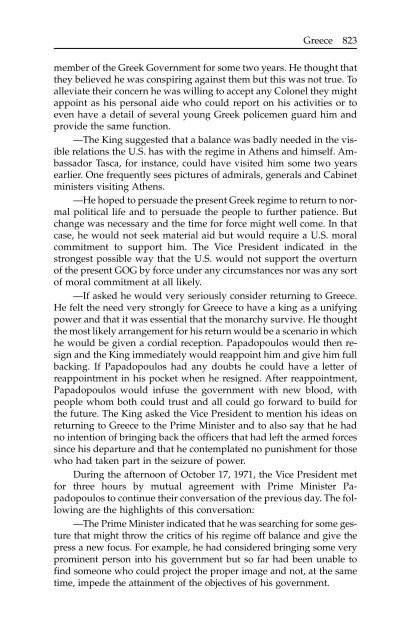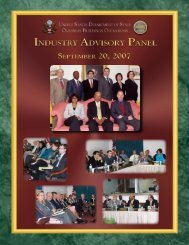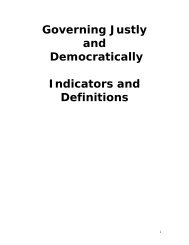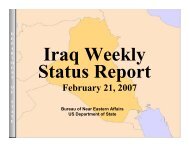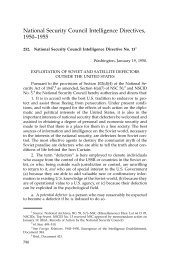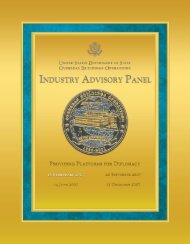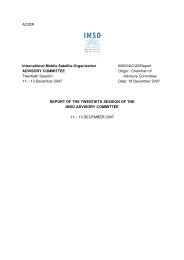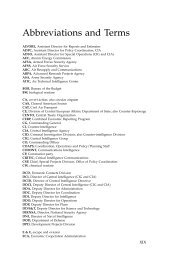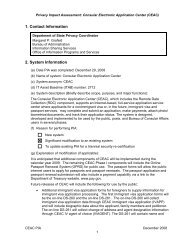Greece - US Department of State
Greece - US Department of State
Greece - US Department of State
Create successful ePaper yourself
Turn your PDF publications into a flip-book with our unique Google optimized e-Paper software.
<strong>Greece</strong> 823<br />
member <strong>of</strong> the Greek Government for some two years. He thought that<br />
they believed he was conspiring against them but this was not true. To<br />
alleviate their concern he was willing to accept any Colonel they might<br />
appoint as his personal aide who could report on his activities or to<br />
even have a detail <strong>of</strong> several young Greek policemen guard him and<br />
provide the same function.<br />
—The King suggested that a balance was badly needed in the visible<br />
relations the U.S. has with the regime in Athens and himself. Ambassador<br />
Tasca, for instance, could have visited him some two years<br />
earlier. One frequently sees pictures <strong>of</strong> admirals, generals and Cabinet<br />
ministers visiting Athens.<br />
—He hoped to persuade the present Greek regime to return to normal<br />
political life and to persuade the people to further patience. But<br />
change was necessary and the time for force might well come. In that<br />
case, he would not seek material aid but would require a U.S. moral<br />
commitment to support him. The Vice President indicated in the<br />
strongest possible way that the U.S. would not support the overturn<br />
<strong>of</strong> the present GOG by force under any circumstances nor was any sort<br />
<strong>of</strong> moral commitment at all likely.<br />
—If asked he would very seriously consider returning to <strong>Greece</strong>.<br />
He felt the need very strongly for <strong>Greece</strong> to have a king as a unifying<br />
power and that it was essential that the monarchy survive. He thought<br />
the most likely arrangement for his return would be a scenario in which<br />
he would be given a cordial reception. Papadopoulos would then resign<br />
and the King immediately would reappoint him and give him full<br />
backing. If Papadopoulos had any doubts he could have a letter <strong>of</strong><br />
reappointment in his pocket when he resigned. After reappointment,<br />
Papadopoulos would infuse the government with new blood, with<br />
people whom both could trust and all could go forward to build for<br />
the future. The King asked the Vice President to mention his ideas on<br />
returning to <strong>Greece</strong> to the Prime Minister and to also say that he had<br />
no intention <strong>of</strong> bringing back the <strong>of</strong>ficers that had left the armed forces<br />
since his departure and that he contemplated no punishment for those<br />
who had taken part in the seizure <strong>of</strong> power.<br />
During the afternoon <strong>of</strong> October 17, 1971, the Vice President met<br />
for three hours by mutual agreement with Prime Minister Papadopoulos<br />
to continue their conversation <strong>of</strong> the previous day. The following<br />
are the highlights <strong>of</strong> this conversation:<br />
—The Prime Minister indicated that he was searching for some gesture<br />
that might throw the critics <strong>of</strong> his regime <strong>of</strong>f balance and give the<br />
press a new focus. For example, he had considered bringing some very<br />
prominent person into his government but so far had been unable to<br />
find someone who could project the proper image and not, at the same<br />
time, impede the attainment <strong>of</strong> the objectives <strong>of</strong> his government.


